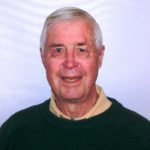 This author writes, “ Today we consume, on average, a staggering 100,000 words of new information each day from various media, . . . a tidal wave of data . . . an unprecedented torrent of chaos . . . . “ It is his exploration of how human minds work when confronted with incessant and confusing change.
This author writes, “ Today we consume, on average, a staggering 100,000 words of new information each day from various media, . . . a tidal wave of data . . . an unprecedented torrent of chaos . . . . “ It is his exploration of how human minds work when confronted with incessant and confusing change.
He challenges us to consider new ways of thinking, ways to use our brains, in light of this flood:
· “the capacity to let go comfortable ideas and become accustomed to ambiguity and contradictions.”
· Then “willingness to experiment and become tolerant of failure.”
· Leading to “elastic thinking, a nonlinear mode of processing in which multiple treads of thought may be pursued in parallel”.
Mlodinow challenges, indeed encourages, our genetic ability to “make great adjustments”, contradicting centuries of fixed dogma handed down by soothsayers, priests, popes, imams, philosophers, and the millions who accept fixed ideas in return for a modicum of mental certainty. He suggests we become “neophiliac”, “attracted to both novelty and change.” For many of us that is a tall order, but Mlodinow makes a convincing argument. As he says, “The good news, as we face increasing novelty and accelerating change inn human society, is that although the changes are disruptive,. . . . Most of us have a good dose of neophilia in our genetic inheritance”.
Here’s how he explains it, “We tend to make quick initial assessments of issues based on the assumptions of the paradigms we follow. When people challenge our assessment, we tend to push back. Whatever our politics, the more we argue with others, the further we can dig I, and sometimes vilify those who disagree. Then we reinforce our ideas by preaching to the choir—our friends. But the mental flexibility to consider theories that contradict our beliefs and don’t fit our existing paradigms not only can make you a genius in science; it is also beneficial in everyday life.”
Mlodinow encourages “the symphonies in idle minds”, noting that our “unconscious minds” are at work all the time: “the brain is active even when a person is not engaged in conscious thought.” He goes on to encourage, therefore, “mindfulness,” those moments when we avoid deliberate though, when we can pause, reflect, and let the mind roam. Don’t even look at your cell phone for 24 hours! “Take a few minutes in the morning after you wake up to simply lie in bed” and “stare at the ceiling” – relax the mind. He also makes several references to the techniques of Buddhism, especially its Zen approach. For those so interested,, do try Robert Wright’s Why Buddhism Is True (2017).
His suggestion: “history—and ordinary human life—is full of opportunities missed by not recognizing that change has occurred and that the previously unthinkable is now doable.”
This fascinating writer concludes: “ To be successful today, we must not only cope with the flood of knowledge and data about the present; we must also be able to anticipate the future, because change happens so rapidly that what works now will be dated and irrelevant tomorrow. The world today is a moving target.”
So open up our minds. And, if you are receptive, try some of his earlier words: Feynman’s Rainbow (2003); The Drunkard’s Walk (2008); and Subliminal (2012).
Editor’s Note: ‘Elastic’ by Leonard Mlodinow was published by Pantheon Books, New York 2018.

About the Author: Felix Kloman is a sailor, rower, husband, father, grandfather, retired management consultant and, above all, a curious reader and writer. He’s explored how we as human beings and organizations respond to ever-present uncertainty in two books, ‘Mumpsimus Revisited’ (2005) and ‘The Fantods of Risk’ (2008). A 20-year resident of Lyme, he now writes book reviews, mostly of non-fiction, which explores our minds, our behavior, our politics and our history. But he does throw in a novel here and there. For more than 50 years, he’s put together the 17 syllables that comprise haiku, the traditional Japanese poetry, and now serves as the self-appointed “poet laureate” of Ashlawn Farm Coffee, where he may be seen on Friday mornings. His late wife, Ann, was also a writer, but of mystery novels, all of which begin in a village in midcoast Maine, strangely reminiscent of the town she and her husband visited every summer.